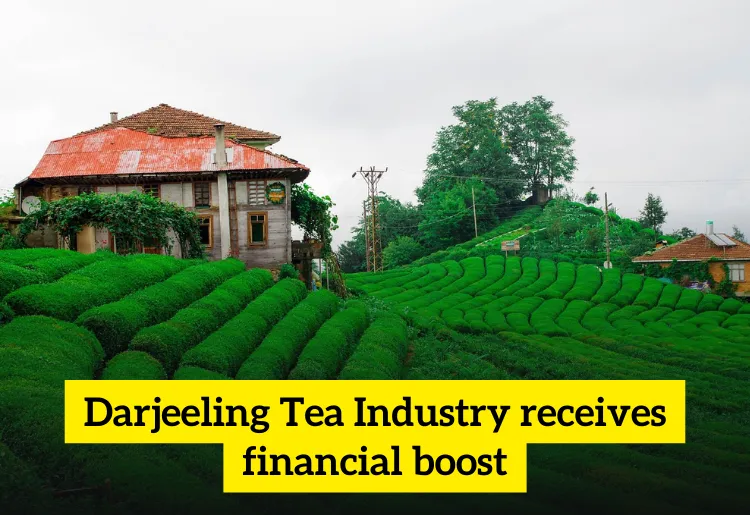Challenges Facing Darjeeling Tea Production

Table of Contents
The Impact of Climate Change on Darjeeling Tea Production
Climate change significantly impacts Darjeeling tea production, posing a serious threat to both yield and quality. Erratic weather patterns and increased pest and disease outbreaks are major concerns.
Erratic Weather Patterns
Unpredictable rainfall, extreme temperatures, and unexpected frost severely affect the delicate tea bushes. This leads to:
- Reduced bud production: Lower yields directly impact the overall production capacity of Darjeeling tea gardens.
- Increased susceptibility to disease: Fluctuations in temperature and moisture levels create ideal conditions for various diseases to thrive.
- Uneven growth cycles: Inconsistent weather patterns disrupt the normal growth cycle of the tea plants, resulting in uneven leaf maturity and affecting the quality of the final product.
The changing climate necessitates the development and implementation of adaptation strategies. This includes investing in research to develop drought-resistant and frost-tolerant tea varieties that can better withstand the unpredictable conditions.
Pest and Disease Outbreaks
Climate change exacerbates the proliferation of pests and diseases, further jeopardizing Darjeeling tea production. We're seeing:
- Increased incidence of blight: This fungal disease can cause significant damage to tea plants, leading to reduced yields and compromised quality.
- Infestations of pests like aphids and mites: These insects can severely damage tea leaves, impacting both quantity and quality.
- Higher fungicide usage: The need to control diseases often leads to increased reliance on chemical pesticides, raising concerns about environmental impact and worker health.
Sustainable pest management techniques, such as integrated pest management (IPM) strategies and the cultivation of disease-resistant cultivars, are essential for mitigating these issues and reducing reliance on harmful chemicals. Investing in research and development of bio-pesticides is also crucial.
Labor Shortages and the Aging Workforce in Darjeeling Tea Gardens
The Darjeeling tea industry faces a critical labor shortage, primarily due to the migration of young people to urban areas seeking better opportunities and an aging workforce lacking sufficient skilled labor.
Migration of Workers
Difficult working conditions, low wages, and a lack of social security benefits are pushing young people away from tea garden work. This leads to:
- Reduced workforce: A shrinking pool of available laborers directly impacts the capacity of tea gardens to maintain production levels.
- Skill gap: The loss of younger workers contributes to a growing shortage of skilled labor in the industry.
- Increased production costs: Finding and retaining workers becomes increasingly expensive, impacting profitability.
Attracting and retaining workers requires significant improvements in wages, benefits, and working conditions. Providing access to healthcare, education, and social security benefits can incentivize young people to consider careers in Darjeeling tea production.
Lack of Skilled Labor
The aging workforce in Darjeeling tea gardens presents another significant challenge. A lack of skilled labor translates to:
- Reduced efficiency: Experienced tea pluckers and processors are essential for maintaining the quality and efficiency of tea production.
- Compromised quality: Lack of skilled labor can lead to inconsistencies in plucking and processing, affecting the final product’s quality.
- Difficulty in meeting demand: The industry may struggle to meet market demand with a less skilled and shrinking workforce.
Addressing this requires robust training programs for new workers and implementing strategies to retain experienced personnel. Apprenticeship programs and incentive schemes can attract and retain skilled labor, ensuring the preservation of traditional expertise.
Market Volatility and Competition from Other Tea-Producing Regions
Darjeeling tea faces significant challenges in the global marketplace, including price fluctuations and intense competition from other tea-producing regions.
Price Fluctuations
Global market demand and fluctuating prices create instability for Darjeeling tea producers:
- Low prices impacting profitability: Unpredictable price swings can make it difficult for producers to remain profitable.
- Difficulty in predicting future earnings: The volatile nature of the market makes long-term planning and investment challenging.
- Financial instability: Producers may struggle to maintain operations and invest in improvements in the face of fluctuating prices.
Developing robust marketing strategies, exploring niche markets, and exploring options for price stabilization through cooperative efforts can help mitigate price volatility.
Competition from Cheaper Teas
Darjeeling tea faces intense competition from cheaper teas produced in other regions, requiring strategic differentiation:
- Loss of market share: Lower-priced teas can significantly impact the market share of Darjeeling tea.
- Pressure on pricing: The need to compete on price can undermine the profitability of Darjeeling tea producers.
- Threat to brand identity: Competition can make it difficult to maintain the prestige and high-quality image associated with Darjeeling tea.
Highlighting the unique characteristics and superior quality of Darjeeling tea is crucial to maintain its market position. Investing in branding, marketing, and promoting the unique terroir and production methods of Darjeeling tea will help differentiate it from cheaper alternatives.
Sustainable Practices and Environmental Concerns
Sustainable practices are crucial for the long-term viability of Darjeeling tea production. Water scarcity and the environmental impact of pesticide use are significant concerns.
Water Scarcity
The region faces increasing water scarcity, directly impacting tea irrigation and processing:
- Reduced yields: Insufficient water supply limits the growth of tea plants and impacts overall production.
- Compromised quality: Water stress can negatively affect the quality of the tea leaves.
- Increased production costs: Finding alternative water sources or implementing efficient irrigation systems can be expensive.
Water conservation techniques, such as efficient irrigation systems, rainwater harvesting, and water recycling, are essential for long-term tea production.
Pesticide Use and Environmental Impact
The use of pesticides can harm the environment and affect the health of workers:
- Environmental pollution: Pesticide runoff can contaminate soil and water sources.
- Worker health risks: Exposure to pesticides can have serious health consequences for workers.
- Damage to biodiversity: Pesticide use can negatively impact the local ecosystem and biodiversity.
Shifting towards organic farming practices, implementing integrated pest management (IPM) strategies, and reducing pesticide use are vital for environmental sustainability and the health of workers.
Conclusion
Darjeeling tea production faces a complex web of challenges, including climate change, labor shortages, market volatility, and environmental concerns. Addressing these issues demands a multifaceted approach, combining sustainable farming practices, investment in worker training and welfare, innovative marketing strategies, and a commitment to preserving the unique qualities of this iconic tea. To secure the future of Darjeeling tea production, immediate and concerted action is needed to implement these solutions and safeguard this precious heritage. The future of Darjeeling tea depends on our collective commitment to overcoming these challenges and safeguarding this world-renowned beverage. Let's work together to ensure the continued production of high-quality Darjeeling tea for generations to come.

Featured Posts
-
 The Wbos Decision Usyk Dubois Rematch Or Parkers Mandatory Fight
May 05, 2025
The Wbos Decision Usyk Dubois Rematch Or Parkers Mandatory Fight
May 05, 2025 -
 Is Canelo Ducking Benavidez Because Of A Shared Nationality
May 05, 2025
Is Canelo Ducking Benavidez Because Of A Shared Nationality
May 05, 2025 -
 Ufc Fight Night Sandhagen Vs Figueiredo Who Will Win A Fight Preview
May 05, 2025
Ufc Fight Night Sandhagen Vs Figueiredo Who Will Win A Fight Preview
May 05, 2025 -
 Us Tariffs Halt Sheins Planned London Stock Market Listing
May 05, 2025
Us Tariffs Halt Sheins Planned London Stock Market Listing
May 05, 2025 -
 Bianca Censoris Sister Angelina Instagram Photos And More
May 05, 2025
Bianca Censoris Sister Angelina Instagram Photos And More
May 05, 2025
